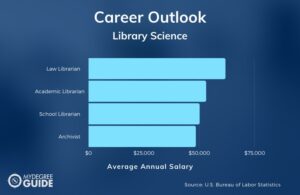Almost all of us have been to libraries in our school and college days to educate ourselves but most of us have not been aware of the science of management behind it known as Library Science.
What is Library Science?
Library Science is the study of practices and tools of management, information technology, and education related to libraries. To put it in simple words, Library Science is the art of organizing, maintaining, and storage of books in a library.
If you think you are a person capable of organizing, have good interpersonal skills, and have an interest in knowledge and information, then you are best suited to work in a library. Of course, you have to hone these skills further.
A Librarian is a person who has been trained in the field of Library Science and is responsible for running library services in public libraries, colleges, universities, and schools.
Today librarians are also called “Information Managers” or “Information Scientists”.
With the rising number of education and research institutes, the importance of libraries is growing day by day. Thus there is an opportunity for a lucrative and exciting career for those professionals who are competent to administer and run a library.
Types of Libraries
There are four major types of libraries
-
Academic Libraries
These Libraries serve schools and colleges
-
Public Libraries
These Libraries serve towns and cities of every kind.
-
School Libraries
School libraries serve school children in school
-
Special Libraries
Special Libraries are those libraries that serve in special places such as hospitals, corporations, museums, the military, private businesses, and the government.
A Brief History of Library Science
As per the historical records, the world’s first librarian was Zenoditus of Ephesus from the end of Ptolemy 1 reign.
Martin Schrettinger of Germany wrote about library science from 1808 to 1829.
Thomas Jefferson devised a classification system inspired by the Baconian Method, which grouped books subject-wise instead of alphabetically. The Jefferson collection provided the start of the Library of Congress.
The first American school of librarianship under the leadership of Melvil Dewey was opened at Columbia University. He was noted for his 1876 decimal classification.
S.R.Ranganathan wrote and published his book “The Five Laws of Library Science in 1931 where he conceived the five laws of library science.
Lee Pierce Butler of the United States devised a new approach by advocating research using quantitative methods and ideas in social sciences. The aim was to use library professionals to address society’s information needs.
William Stetson Merrill released his book “A Code of Classifier ” from1914 to 1949, which provided a more pragmatic approach and in-depth knowledge about each field of study related to the system of classification.
The Digital Stage of the twenty-first century has transformed the way of accessing and retrieving information. The library has now become a part of a complex and dynamic educational, recreational, and information infrastructure. The use of computers and mobile devices with wireless high-speed networking has a profound impact on information science and information services.
The Library science has maintained its mission of access equity and community space throughout its evolution. It has developed new means for information retrieval called information literacy skills. All catalogs, databases, and a growing number of books are now available on the internet.
Library Science in India
The Trivandrum Public Library established in 1829 is the first state central library in India.
The father of Library Science in India was Dhiyali Ramamrita Ranganathan(1892-1972) from Bangalore, Mysore. His Five laws of Library Science in 1931 had a worldwide influence on the teaching and practice of library science.
Sayyaji Rao Gaekwad the Maharaja of the erstwhile princely state of Baroda is credited with the starting of library science education in India at the beginning of the twentieth century.
Harinath De from 1877 to 1911 was the first Indian librarian of the National Library of India, then known as Imperial Library. He was an Indian historian, scholar, and polyglot.
How to Start a Career in Library Science


A career in Library Science includes organizing and maintaining books, magazines, and journals in libraries.
Professionals in Library science may benefit by earning certifications and taking online courses. This will help them to advance in their career path. Professional certification in library science shows experience in library science and enhances the existing skills.
The library science professionals demonstrate their understanding and adherence to the latest technologies, resources, and practices in library science by earning a Certification in Library Science.
The Job Profile for library science includes the ability to categorize the information required by the people visiting the libraries and having the knowledge of Information systems management, classification/cataloging systems, bibliography, documentation, preservation, and conservation of manuscript, collection management, information system and technology, research methodology, computer applications, reference statistics and management, information processing, archives management, indexing, library planning, etc.
Eligibility for Library Science courses
To be eligible for a Bachelor’s course in Library Science you must have passed the Higher Secondary School Certificate(10+2)examination with science as the main subject(Physics, Chemistry, Maths, and Biology).
To be eligible for a Master’s degree in Library Science, you must have a bachelor’s degree in Science subject.
Certificate and Diploma Courses in Library Science
Here are some of the courses that you can pursue a career in Library Science. You may also do a Library Science degree online that may or may not be recognized by the Government. Institutes like IGNOU offer library science courses through distance learning.
Diploma Courses in Library Science
- Certificate in Library Science
- Certificate in Library and Information Science
- Diploma in Library and Information Science
- Post Graduate Diploma in Library Automation and Networking.
Bachelor Courses in Library Science
- Bachelor in Library Science(B.Lib.)
- Bachelor of Library and Information Science(B.Li Sc.)
Master Course in Library Science
- Master in Library Science
- Master in Library and Information Science(MLIS)
Doctoral Courses in Library Science
- Ph.D. in Library and Information Science
- M. Phil in Library and Information Science
What is B.Lib.Sc. (Bachelor of Library Science)?
B.Lib.Sc.(Bachelor of Library Science) is a postgraduate academic degree course that is designed to give students an understanding of Library science, its basic principles, laws, and its impact on society. The course teaches students how to manage books and other materials in a library.
Blis course is basically a one-year duration course. Admission to B.Lib.Sc. is provided on the basis of both merit and an entrance exam depending on the policy of the institution where you want to take the admission.
Skills required for BLibSc
Students who have a passion for reading and maintaining books are regarded as suitable for a career in Library Science. Here are a few of the skills that a candidate must possess if he wants to pursue a career in Library Science.
- Analytical thinking to take administrative decisions.
- Leadership to maintain effective communication and supervise library staff.
- Good communication skills to organize Job duties
- Problem-solving skills
- Creativity to learn digital skills.
- Research skills to research a topic in detail.
What is the Course Curriculum in BLibSc?
Here are a few of the subjects taught in BLib.Sc. course
- Library Information & Society
- Library Classification(Practical)
- Library Cataloguing(Practical)
- Information sources & Services
- Project work literature and field study
- Library classification(Theory)
- Library Cataloguing(Theory)
- Library Management & Information centers
- Library Information Technology
Top Colleges in Bachelor in Library Science(B.Lib.Sc)
Here are a few of the top colleges offering Library Science degrees in India.
-
Jai Hind College
Jai Hind College is located in Churchgate, Mumbai. The total course fee is Rs 47.74 thousand with 720 seats.
-
Delhi Technological University
Delhi Technological University is located in East Delhi. The total course fee is Rs2.97 lacs with 151 seats.
-
Delhi School of Economics
Delhi School of Economics is located in North Campus, Delhi. The total course fees is from Rs12K to Rs29K with 290 seats.
-
Symbiosis Colleges of Arts& Commerce
Symbiosis Colleges of Arts& Commerce is located in Senapati Bapat Road, Pune. The total course fees is Rs 45K
-
Indian Institute of Technology, Mumbai
IIT Bombay is located in Powai, Mumbai. The total course fee is Rs8.33 lacs with 32 seats.
-
NDA – National Defence College
NDA is located in Pune. The total course fee is Rs 1.67 lacs.
Other than the above institutes here are a few more colleges and Universities that offer Library science degrees.
- Alagappa University, Karaikudi
- Aligarh Muslim University, Aligarh
- Allahabad University
- Annamalai University, Annamalainagar
- Awadhesh Pratap Singh University, Rewa
- Babasaheb Bhimrao Ambedkar University, Lucknow
- Banaras Hindu University, Varanasi
- Bundelkhand University, Jhansi
- Devi Ahilya Vishwavidyalaya, Indore
- Dr. Bhim Rao Ambedkar University, Agra
- Dr. Harisingh Gour Viswavidyalaya, Sagar
- Gulbarga University, Gulbarga
- Guru Ghasidas University, Bilaspur
- Guru Nanak Dev University, Amritsar
- Dr. Harisingh Gour University, Sagar
- HNB Garhwal University Srinagar – Garhwal
- Jadavpur University, Calcutta
- Jamia Millia Islamia, New Delhi
- Jiwaji University, Gwalior
- Karnatak University, Dharwad
- Jamia Millia Islamia, New Delhi
- Kurukshetra University, Kurukshetra
- Nagpur University, Nagpur
- North-Eastern Hill University, Shillong
- Pandit Ravishankar Shukla University, Raipur
- Panjab University, Chandigarh
- Patna University, Patna
- Punjabi University, Patiala
- Rani Durgavati Vishwavidyalaya, Jabalpur
- Sambalpur University, Sambalpur
- SNDT Womens’ University, Mumbai
- University of Delhi, Delhi
- University of Hyderabad, Hyderabad
- The University of Jammu, Jammu (Tawi)
- University of Kashmir, Srinagar
- University of Lucknow, Lucknow
- University of Madras, Chennai
- University of Mysore, Mysore
- University of Pune, Pune
- University of Rajasthan, Jaipur
- Vikram University, Ujjain
- Rajarshi Tandon Open University, Allahabad (Distance Education)
- Indira Gandhi National Open University,(IGNOU), New Delhi (Distance Education)
The Scope of Library Science


By compiling, preserving, and disseminating information, Library Professionals are known to provide valuable services to society. You can easily find a job in schools and colleges after completing your course. You can also work in government and corporate settings. You can work in public and private libraries. With the growth of the Internet, there has been an increase in demand for library professionals with knowledge in Library Science and computer skills.
Most of the job profiles in library science focus on one of the following:
- User Services
These services connect people to the information they need.
- Technical Services
These services include ordering, cataloging, and preparing materials.
- Computer Services
Library professionals working in computer services maintain databases, do software programming and web page design.
- Administrative Services
The Library professionals manage the library and services, negotiate contracts with vendors, supervise library staff, and prepare budgets.
After getting a degree in B.Lib.Sc you can work as a High school teacher, Middle school teacher, and special education teacher. The average salary you can get is around 60,000 US$ per annum.
After getting a master’s degree in Library science, you can work as a librarian in a library with an earning potential of 60,000,$US per annum. You can work as an elementary, middle, or High school principal with an earning potential of 96,000 UD$. You can work as a Postsecondary Education administrator in colleges and Universities Instructional coordinator in schools and colleges, and even as School and career counselor to help students to select appropriate careers.
In case you have earned a Doctorate in Library Science, there is a job opportunity for you as a Post-secondary school teacher, Survey researcher, computer and Information research scientist.
The Scope of Library Science In India
In India also there are ample options for students with a degree in Library Science. Today librarians are not only Information providers but they also see the information in the library is systematically organized and constantly update
Today Librarians are in high demand in both government and private sectors in India. They can work as a research assistant to professors, or in publishing companies in preparing bibliographies and catalogs. The students can go for higher studies in this field. The more the number of schools and colleges, the greater the demand for the students of Library Science.
Here is the list of recruiters who can offer you a job as a librarian in their institute.
- Libraries
- Universities
- Colleges
- Corporate Training Centres
- Research Institutions
- Media Organizations
- Consulting Firms
- Foreign Embassies
- Museums
- Photo/film libraries.
Librarians get an excellent salary package in both the private and government sectors.
In India, the average salary of a Librarian is between Rs 2 to 4 lacs per annum while in the United States you can expect to earn an average salary of $48,000 per annum.
However, the salaries vary depending upon various factors like working area, education, experience and so on. With a master’s degree and good experience, one can get a very good salary package.
The average salary of an assistant librarian is Rs1.5 lac per annum in India. The average salary of a senior librarian is about Rs 3.6 lacs per annum. An Information Architect can earn from Rs 10 to 20 lacs per annum. An information analyst can earn from 1.5 to 20 lacs per annum and a technical writer from 2 to 10 lacs per annum.
Job Profiles for students in Library Science
Here are a few of the Library Science Jobs For a B.Lib.Sc. graduate in both private and public sectors.
-
Archivist
All assembling, cataloging, and managing valuable collections of historical information is done by an Archivist.
-
Consultant
A library consultant provides consultation and problem-solving assistance to administrators that relate to library plans, management, governance, funding, etc.
-
Cataloguer
A Cataloguer is responsible for managing the catalog of different materials at a library. The Cataloguer prepares bibliographic and item records for journals, monographs, and other library material.
-
Curator
All assembling, classifying, managing, and presentation of books in the library are done by the Curator.
-
Deputy Librarian
The Deputy Librarian works with the Assistant librarian and library assistant to report on library improvement, development, and budgeting issues.
-
Library Assistant
The Library Assistant is responsible for compiling records, sorts and shelves of the books, and issues and receives library materials like pictures, cards, and slides.
-
Library Director
The library director’s responsibility is to check books in and out for customers, oversee employees and staff members. He ensures the smooth running of the day-to-day operations of the library.
-
Indexer
The task of an Indexer is to review documents. He compiles Indexes to make information searches much easier.
-
Electronic Resources Librarian
An electronic Resources Librarian ensures the smooth running of electronic resources of a library including Databases, ebooks, streaming videos, etc.
-
Information Architect
An Information Architect is responsible to ensure the user-friendly design of websites and other applications in a library.
-
Library Science Teacher
The task of a Library Science teacher is to prepare and deliver different topics related to Library Science to undergraduate and graduate students.
-
Law Librarians
A Law Librarian works for law school or law firms. He is responsible for managing different library operations, helping in research, budget monitoring, etc.
The Future of Library Science
In 2008, Library Science was ranked as the “Best career” for students. The employment of librarians and library media specialists is projected to grow by 9% from 2020 to 2030.
The bureau of labor statistics projects a growth of 5% between 2019 and 2029 for librarians.
As India is moving towards an Information and knowledge-based society with the proliferation of learning and research institutes the demand and importance of Library Science are bound to grow in the years to come.





